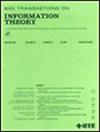A Time-Causal and Time-Recursive Analogue of the Gabor Transform
IF 2.2
3区 计算机科学
Q3 COMPUTER SCIENCE, INFORMATION SYSTEMS
引用次数: 0
Abstract
This paper presents a time-causal analogue of the Gabor filter, as well as a both time-causal and time-recursive analogue of the Gabor transform, where the proposed time-causal representations obey both temporal scale covariance and a cascade property over temporal scales. The motivation behind these constructions is to enable theoretically well-founded time-frequency analysis over multiple temporal scales for real-time situations, or for physical or biological modelling situations, when the future cannot be accessed, and the non-causal access to the future in Gabor filtering is therefore not viable for a time-frequency analysis of the system. We develop a principled axiomatically determined theory for formulating these time-causal time-frequency representations, obtained by replacing the Gaussian kernel in the Gabor filtering with a time-causal kernel, referred to as the time-causal limit kernel, and which guarantees simplification properties from finer to coarser levels of scales in a time-causal situation, similar as the Gaussian kernel can be shown to guarantee over a non-causal temporal domain. We do also develop an axiomatically determined theory for implementing a discrete analogue of the proposed time-causal frequency analysis method on discrete data, based on first-order recursive filters coupled in cascade, with provable variation-diminishing properties that strongly suppress the influence from local perturbations and noise, and with specially chosen time constants to achieve self-similarity over scales and temporal scale covariance. In these ways, the proposed time-frequency representations guarantee well-founded treatment over multiple temporal scales, in situations when the characteristic scales in the signals, or physical or biological phenomena, to be analyzed may vary substantially, and additionally all steps in the time-frequency analysis have to be fully time-causal.求助全文
约1分钟内获得全文
求助全文
来源期刊

IEEE Transactions on Information Theory
工程技术-工程:电子与电气
CiteScore
5.70
自引率
20.00%
发文量
514
审稿时长
12 months
期刊介绍:
The IEEE Transactions on Information Theory is a journal that publishes theoretical and experimental papers concerned with the transmission, processing, and utilization of information. The boundaries of acceptable subject matter are intentionally not sharply delimited. Rather, it is hoped that as the focus of research activity changes, a flexible policy will permit this Transactions to follow suit. Current appropriate topics are best reflected by recent Tables of Contents; they are summarized in the titles of editorial areas that appear on the inside front cover.
 求助内容:
求助内容: 应助结果提醒方式:
应助结果提醒方式:


